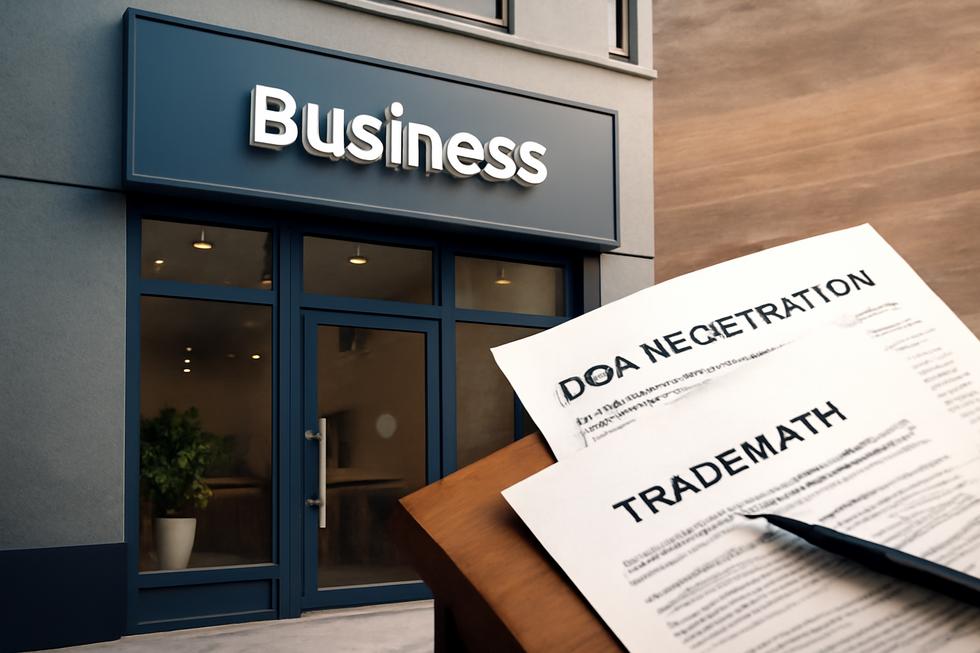Introduction
For business owners, understanding the nuances between a trade name and a DBA (Doing Business As) is essential for legal compliance, effective branding, and operational clarity. While these terms are often used interchangeably, they carry distinct definitions and implications that can impact how your business is recognized publicly and legally. This article unpacks their definitions and legal distinctions, examines the registration requirements and legal implications, and clarifies their roles in branding and intellectual property protection. Each chapter builds a clearer understanding that will empower you to make informed decisions about naming your business and protecting your brand.
Tables of Contents
Chapter 1: Understanding if a trade name is the same as a DBA: Definitions and Legal Distinctions
- Clarifying the Public Identity: How Trade Names and DBAs Differ in Usage and Legal Standing
- Legal Registration and Liability: Crucial Differences Between Trade Names and DBAs
Chapter 2: Examining if a trade name is the same as a DBA: Registration Requirements and Legal Implications
- Navigating the Legal Nuances and Registration Obligations of Trade Names and DBAs
- Navigating Liability and Brand Protection: Legal Realities Behind Trade Names and DBAs
Chapter 3: Clarifying if a trade name is the same as a DBA: Impact on Branding and Intellectual Property Rights
- How Trade Names and DBAs Shape Branding Flexibility and Market Identity
- Understanding Legal Limitations of Trade Names and DBAs: Why Intellectual Property Protection Requires More than a Registered Business Name
Chapter 1: Understanding if a trade name is the same as a DBA: Definitions and Legal Distinctions

1. Clarifying the Public Identity: How Trade Names and DBAs Differ in Usage and Legal Standing
Navigating business names often leads to confusion between the terms trade name and DBA (Doing Business As). While these concepts are closely linked and frequently overlap in daily conversation, their legal and practical distinctions are important for any business owner to understand. A trade name essentially represents the public identity of a business — the name customers recognize, see advertised, and associate with products or services. It is the brand name under which a company operates in commerce and marketing. This name can either be officially registered or simply used informally without legal recognition, depending on the jurisdiction and the nature of the business.
In contrast, a DBA is a formal, legal registration of a chosen business name differing from the entity’s official legal name. It functions as a legally recognized alias or fictitious business name that must be registered with state or local authorities. This registration ensures transparency by publicly disclosing who truly owns and operates the business, which protects consumers and supports compliance with business laws. For example, a sole proprietor named Jane Smith might register “Jane’s Cupcakes” as a DBA to operate publicly under that inviting, brand-friendly name instead of her personal legal name. This makes “Jane’s Cupcakes” both her trade name in everyday use and her DBA in legal terms.
However, it is critical to grasp that the DBA itself does not create a separate legal entity nor does it grant any proprietary rights. It simply acknowledges the name under which the business operates. This means registering a DBA does not protect the name from use by others — for exclusive rights, a trademark registration is necessary. Trademark law provides broader intellectual property protection, preventing other businesses from using confusingly similar names or marks nationwide.
Meanwhile, the trade name as a concept is more fluid. A business may use a trade name without registering it as a DBA if the local laws do not require registration, but this may limit legal clarity and consumer protection. Conversely, some jurisdictions equate trade names and DBAs, leading to interchangeable usage. Still, in legal and operational terms, the DBA emphasizes the duty of transparency and legal compliance, while the trade name focuses on public recognition and branding.
Neither a DBA nor a trade name shields the business owner from liability or personal responsibility for the business’s obligations. They serve primarily to identify the business’s public persona and maintain regulatory openness about ownership. Business owners should therefore consider registering a DBA when using a name different from their legal business name to meet legal requirements and avoid penalties.
To summarize, the trade name reflects how a business wishes to be perceived in the marketplace — an identity designed to attract customers and build brand presence. The DBA, on the other hand, is the legally registered name under which the business officially conducts operations if it differs from the legal name. Recognizing this distinction helps clarify the legal groundwork beneath a company’s public face, ensuring business owners comply with regulations while effectively branding their ventures.
For those interested in protecting their business name beyond registration, understanding trademark rights is crucial. More information about trademark protection and its difference from trade name and DBA registration can be found at trademark protection business name and logo.
2. Legal Registration and Liability: Crucial Differences Between Trade Names and DBAs
A trade name and a DBA (Doing Business As) are often used interchangeably in everyday speech, but they reveal important distinctions when examined through the lens of legal registration and liability. Fundamentally, a DBA is a formal process of registering a business name that differs from the legal name of its owner or entity, whereas a trade name is the name a business actually uses in public, marketing, and commerce. This subtle difference carries significant implications for compliance and legal responsibility.
When a business wishes to operate under a name other than its official legal name, usually the personal name for sole proprietors or the name on the formation documents for LLCs and corporations, it must typically complete a DBA registration with the appropriate state or local agency. Filing a DBA registers this alternate name as an official alias allowing that business to conduct transactions and represent itself using the chosen trade name in a compliant manner. However, this registered alias does not establish a separate legal entity; it is merely a recorded acknowledgment by governmental authorities to inform the public and ensure transparency about the real ownership behind the business name.
In contrast, the trade name is the public face of the business, representing brand identity and recognition. It may or may not be registered as a DBA. Some businesses use trade names that remain informal and unregistered, especially if they operate in jurisdictions where registration is optional or unnecessary for their scope of business. Nonetheless, when a trade name is registered as a DBA, it gains legal recognition as the official name under which the company operates, even though this does not transform its legal status.
This leads to the critical issue of liability. Registering a DBA does not shield the business owner from personal liability incurred by the business. Owners of sole proprietorships or partnerships who file a DBA remain fully accountable for debts, lawsuits, and other obligations. The DBA registration purely facilitates the use of a different name for business dealings without providing any legal protection to separate personal assets from business risks. By contrast, forming an LLC or a corporation creates a legally distinct entity that offers limited liability protection. This protection is a fundamental reason many business owners choose to establish formal entities rather than relying solely on a DBA.
Moreover, a DBA or trade name registration does not confer exclusive rights to the name in the marketplace. Unlike trademarks, which grant intellectual property protections safeguarding brand names and logos nationwide, DBAs do not prevent others from adopting similar or identical names. For stronger brand protection and exclusivity, businesses are advised to pursue trademark registration in addition to any DBA filings.
To summarize, a DBA serves as the legal registration of a business’s trade name. This registration is essential for compliance when using a different name from the legal owner’s name, but it does not create a separate legal entity or limit personal liability. The trade name itself is the commercial identity used by the business, whether or not it is formally registered as a DBA. Business owners aiming to protect their personal assets and secure exclusive rights to their brand should consider forming an LLC or corporation and obtaining trademark protection.
For a more detailed understanding of how trademark protections differ from trade name registrations, see this comprehensive guide on trademark protection for business names and logos at trademark2go.com.
Chapter 2: Examining if a trade name is the same as a DBA: Registration Requirements and Legal Implications

1. Navigating the Legal Nuances and Registration Obligations of Trade Names and DBAs
Businesses often rely on names beyond their formal legal entity titles to engage customers and establish market presence. A trade name functions as the public identity, the brand name under which a company markets its goods or services. In contrast, a Doing Business As (DBA) is a legal registration process that authorizes a business to operate under a name different from its registered legal name. Although these terms overlap in everyday use, parsing their distinctions reveals crucial legal and procedural subtleties.
When a business forms an LLC, corporation, or similar entity, it registers its official legal name with the state. This name is the entity’s legal identifier, granting state-level exclusivity and tying directly to its liability protections. No other business within that jurisdiction may use this exact name. However, companies often desire to operate under multiple names or more marketable aliases for different products or services. This is where DBA registration enters the picture.
Registering a DBA involves filing the chosen alternate name with a state or local government office—usually a county clerk or similar agency. This process is mandatory when a business wants to publicly operate under a trade name differing from its legal entity name. For example, “Green Leaf Consulting LLC” might register the DBA “Green Leaf Marketing” to promote a distinct service line. This registration informs the public about the business’s true ownership, ensuring transparency and compliance with local laws. Without registering a DBA where required, businesses risk legal penalties, including fines or the inability to enforce contracts under an unregistered alias.
Despite formal registration, a DBA does not create a separate legal entity or confer liability protection apart from the original entity. For instance, sole proprietors who register a DBA remain personally liable for business debts and obligations. Similarly, DBAs do not guarantee exclusive rights to the name beyond their jurisdiction or serving as a shield against other businesses using the same or similar names. This contrasts with trademarks, which provide nationally recognized exclusive rights within specific industry categories. While both trade names and DBAs can develop common law rights through consistent commercial use, only federal trademark registration can establish broad legal protection and enforcement power.
Interestingly, not all trade names require DBA registration. If a business operates strictly under its legal entity name—such as “Smith & Sons LLC” without any alternate names—it typically does not need to file a DBA. Sole proprietors using only their own personal names often avoid this step as well. However, any deviation to a name that suggests a different identity usually triggers mandatory DBA registration per state law.
In practice, many companies adopt multiple DBAs to target diverse markets while maintaining one legal entity. This approach provides branding flexibility without the expenses and complexities of setting up separate corporations or LLCs. The registered DBA essentially acts as the formal acknowledgment of the trade name in use for business transactions and public communications.
Understanding the relationship between trade names and DBAs is fundamental for legal compliance and effective brand management. Registering a DBA formalizes the use of an alternate business name but does not replace the underlying entity’s legal identity or provide trademark-like protections. For detailed guidance on trademarks and brand protections that extend beyond DBA registration, exploring resources on trademark protection for business names and logos can be invaluable.
In summary, a trade name is the commercial face of the business, possibly informal, while a DBA is the legally registered name permitting that trade name’s official use. Navigating these distinctions ensures businesses operate transparently within regulatory frameworks, safeguard their branding efforts, and avoid costly compliance pitfalls.
2. Navigating Liability and Brand Protection: Legal Realities Behind Trade Names and DBAs
When exploring the legal relationship between a trade name and a DBA (Doing Business As), it is crucial to understand that although these terms often describe the same public-facing business name, their legal implications, especially concerning liability and brand protection, differ significantly. A trade name represents the identity a business adopts for commercial use, whether or not it is officially registered. Conversely, a DBA refers to the legal registration of that trade name with relevant state or local authorities to comply with transparency laws and business regulations. Despite this connection, neither designation confers a separate legal entity status nor shields the business owner from personal liability.
The absence of liability protection under a trade name or DBA is a critical legal reality many business owners overlook. Operating under a DBA does not insulate an individual from debts or lawsuits. Unless the underlying business entity is incorporated as a Limited Liability Company (LLC), corporation, or another formal structure that offers legal separation, the sole proprietor or partners remain personally accountable for financial and legal obligations incurred by the business. This distinction is essential because a DBA’s primary function is to notify the public and regulatory agencies of the name under which a business operates, not to alter the legal or financial responsibilities of the owner.
Registering a DBA facilitates marketing flexibility and operational clarity. It permits businesses—sole proprietorships, partnerships, or even corporations—to transact under a different name without creating a new legal entity. However, this registration does not grant exclusive use of that name. Multiple entities across states, or even within the same jurisdiction, can register identical or very similar DBAs. This lack of exclusivity may expose businesses to instances of name duplication, leading to consumer confusion or legal disputes if another party asserts trademark rights over that name.
This brings to the forefront the vital role trademarks play in brand protection. Unlike a trade name or DBA registration, federal trademark registration creates enforceable intellectual property rights that protect a business’s name, logo, or slogan nationwide. These rights prevent others in similar industries from using marks that could cause confusion, thereby preserving brand reputation and market distinctiveness. Trademark protection requires a separate federal application, typically filed with the United States Patent and Trademark Office (USPTO), which provides the trademark owner exclusive national rights in exchange for a detailed examination process and ongoing maintenance.
State and local laws govern the registration of DBAs and trade names, and requirements vary widely. Typically, a business must register its assumed name with a designated agency before conducting business publicly under that name. While these agencies often require the name to be unique within their jurisdiction to avoid confusion, no automatic reservation or nationwide exclusivity is granted. This limitation underscores why businesses serious about protecting their brand identity should explore trademark registration in addition to their DBA filings.
In practical terms, a DBA or trade name functions as a vehicle for operating distinct business brands without forming separate entities. However, this convenience does not equate to legal protections traditionally associated with registered company names or trademarks. Business owners should view DBA registration as a compliance step for transparency and marketing, while relying on trademarks to secure exclusive rights and brand integrity. For further insights on protecting your business name or logo through trademark law, exploring resources like the comprehensive guide on trademark protection for business names and logos can be invaluable.
Understanding these legal distinctions helps businesses align their naming strategies with appropriate protections, fulfilling both regulatory obligations and safeguarding their commercial identity.
Chapter 3: Clarifying if a trade name is the same as a DBA: Impact on Branding and Intellectual Property Rights

1. How Trade Names and DBAs Shape Branding Flexibility and Market Identity
Understanding the nuanced relationship between a trade name and a DBA (Doing Business As) is vital for businesses focused on branding and market positioning. While often used interchangeably, these two terms represent different facets of a business’s public identity and legal recognition, and this distinction has significant implications for how a business presents itself and competes within its market.
A trade name is essentially the brand identity—the name a company chooses to represent itself in commerce, marketing, and customer interactions. It is the face of the business, helping customers recognize and differentiate products or services. Conversely, a DBA is the formal registration of that trade name with governmental authorities, typically at the state or local level. This registration allows a business to operate legally under a name different from its registered legal name, which is important for transparency and regulatory compliance but does not create a new legal entity.
This connection between trade names and DBAs provides businesses essential flexibility in branding strategies. For example, a corporation or sole proprietorship can develop multiple trade names for various product lines or services without the need to establish separate legal entities for each. By registering each trade name as a DBA, the business can market diversified brands tailored to distinct customer segments or territories while maintaining consolidated management and operational efficiency. This approach is particularly beneficial for testing new markets or rebranding efforts without incurring the complexities of forming new companies.
Moreover, registering a DBA formalizes the trade name’s use in commerce, allowing the business to open bank accounts, enter into contracts, and advertise under that name confidently. This legal backing enhances credibility, reassuring customers and partners that the business is transparent about its ownership and operation. Without such registration, using a trade name might risk legal challenges or complications in business transactions.
However, it is crucial to recognize that neither a DBA nor a trade name registration provides the robust protections afforded by trademarks. These registrations do not grant exclusive rights to the name on a nationwide scale, meaning identical or similar DBAs can exist in different jurisdictions. For stronger brand protection and to reinforce market positioning, businesses often pursue trademark registration alongside DBA filings. Trademarks secure intellectual property rights that prevent others from using confusingly similar names, thereby preserving brand distinctiveness and customer loyalty.
Selecting a compelling trade name and registering it properly as a DBA can significantly influence how a business is perceived, helping carve out a unique space in competitive markets. The trade name reflects the business’s personality, mission, and promise to customers, while the DBA legitimizes that identity in the eyes of regulators and commercial partners. Together, they form the backbone of strategic branding efforts that balance legal compliance with marketing impact.
For those interested in deeper insight into protecting and managing business names, exploring resources on trademark protection and naming conventions can provide valuable guidance, especially when differentiating between trade names, DBAs, and trademarks. One such resource offers a detailed explanation of the distinctions and legal aspects surrounding DBAs and trade names, which can help businesses better navigate their branding and intellectual property decisions.
2. Understanding Legal Limitations of Trade Names and DBAs: Why Intellectual Property Protection Requires More than a Registered Business Name
When a business selects and uses a trade name or a DBA (Doing Business As), it enters the realm of public identity and legal compliance. Although often confused or used interchangeably, a trade name and a DBA represent different aspects of how a business identifies itself, especially in the eyes of the law and customers. Importantly, neither offers intrinsic legal safeguards against name misuse or brand infringement, which has considerable implications for protecting intellectual property.
A DBA is fundamentally a legal registration process that authorizes a business to operate under an alternate name instead of its official legal name. This registration is typically required by state or local governments to maintain transparency about business ownership. However, registering a DBA does not create a separate legal entity, nor does it prevent other businesses from using the same or a similar name in the same or other jurisdictions. The primary function of a DBA is to comply with local laws and to inform the public, rather than to establish exclusive rights.
Conversely, a trade name is the public-facing designation used in commerce, marketing, and branding efforts. It represents how a company presents itself to customers and the marketplace. While a trade name may coincide with a DBA when officially registered, in many instances it is simply the name that consumers recognize, regardless of whether it is legally registered with any authority. This means a business could use a trade name without any formal registration, which further emphasizes its role as a brand identity rather than a protective legal mechanism.
What distinguishes a DBA or trade name from intellectual property protections is their lack of exclusive rights. Registering a DBA or merely using a trade name does not grant the business sole use of that name nationwide. For example, several businesses in different states can legally register the exact same DBA without conflict, as DBAs are recognized only at the state or local level. This overlapping usage can lead to confusion and limits the ability of businesses to defend their brand identity strictly under DBA or trade name registrations.
For businesses seeking to secure exclusive rights and stronger legal protections against infringement, trademark registration is crucial. Unlike DBAs or trade names, a federally registered trademark grants nationwide exclusivity to use a specific name, logo, or slogan in connection with the goods or services listed. It provides legal recourse to prevent others from using confusingly similar marks, helping safeguard brand reputation and consumer trust. Trademarks operate within intellectual property law, thus serving a fundamentally different purpose than mere business name registration.
Moreover, forming a separate legal entity, such as an LLC or corporation, offers additional protections unrelated to brand exclusivity but important for liability and legal recognition. While DBAs and trade names alone do not shield owners from personal liability, an LLC or corporation creates a legal separation between the business and its owners.
In summary, while trade names and DBAs are essential elements of a business’s public identity and fulfill legal requirements for operating under alternate names, they do not substitute for intellectual property rights or liability protection. Combining business entity formation with trademark registration and DBA filings can provide a comprehensive strategy to protect both legal interests and brand value. Businesses should view DBA registration as one step within a broader framework of brand and legal protection—not the entire solution.
For further insights into protecting business names and intellectual property beyond DBAs, exploring resources on trademark protection can provide valuable guidance, such as this detailed discussion on trademark protection for business names and logos.
Final thoughts
Distinguishing between a trade name and a DBA is more than a semantic exercise—it shapes how a business presents itself to the public and complies with legal requirements. The trade name acts as the visible face of your business, shaping customer perception and brand identity, while the DBA serves as the legal registration confirming your right to operate under that name. Both are essential but serve different purposes: one for branding and market presence, the other for legal transparency and regulatory compliance. Remember, neither replaces trademark protection, which is vital to securing exclusive rights to your brand. By grasping these distinctions, business owners can better navigate naming strategies, ensure compliance with local laws, and pursue robust intellectual property protection that safeguards long-term success.
Your IP is the foundation of your success – let’s protect it together before it’s too late. We can’t wait to help you turn your ideas into legally secured assets.
About us
undefined


